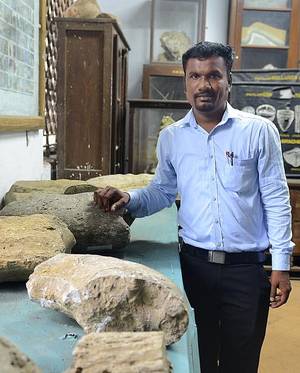Award-winning geologist C Singaraja explains how what’s happening beneath our feet impacts our lives and health
It’s Shawshank Redemption in real life. Or, if you prefer, Erin Brockovich. In the first, a banker (Tim Robbins) charged with murder is sent to a high-security prison where he uses his fine knowledge of rocks to dig a tunnel and escape.
In the second, based on a true story, Erin Brockovich, a law-firm assistant (Julia Roberts) investigates a chemicals company that releases untreated hexavalent chromium thus contaminating groundwater and jeopardising the health of local residents.
Geologist Dr C Singaraja was recently conferred a Dr APJ Abdul Kalam prize for Young Scientist — 2017, by Marina Labs R&D, Chennai, a Medical Research Center and Biotechnology Company. The award was given in recognition of his study of groundwater. Rocks, water, contamination: how does he join the dots?
“I did my graduation and post graduation studies in Thoothukudi, and moved to Annamalai University for my M.Phil and doctorate work,” he says. “My paper for MPhil was on how tidal variation affects groundwater along the Cuddalore coast. My PhD thesis on the other hand was on the hydro-geo chemistry of groundwater in Thoothukudi district. This place has sea-water intrusion and heavy-metal pollution by industries. I checked the land for the presence of radon and fluoride and their effect on groundwater.”
He listed the findings. Groundwater is impacted by salt content in coastal regions. In inland areas the weathering of bed-rock leaches mica, fluorite and fluoro-apatite into groundwater. The report educates panchayats and builders about water quality, and the reasons why it gets contaminated.
Singaraja also worked as an assistant on a project that surveyed soil in Thoothukudi, Dindigul, Krishnagiri, Nagapattinam, Puducherry and Villuppuram. He prepared a groundwater quality index, and pointed to where people could find good aquifer zones.
The team tested and labelled water quality region-wise based on scientific parameters. “In Cuddalore district we showed how tidal waves and salt-pans impacted water salinity, and how this affected sea creatures. We devised a method to remove excess fluoride from water using natural materials,” he says
Since 2009 Singaraja has been part of several soil-testing projects and has written 40 papers on hydro-geology. “Rocks don’t change for millennia, but water content does, indicating what’s happening beneath our feet and how it impacts our lives and health.” He also studies what he calls medical geology. “It looks into the health effects of rocks,” he explains. For example, granite, a source rock, contains naturally-occurring uranium and radon, and exposure to weather makes uranium radio-active and radon into gas. These run into groundwater, making it unsafe.
Doing research on water quality in 100-plus villages was memorable. “Some villagers noticed the instrument we dipped in the water and accused us of poisoning their sources. Others knew what we were doing and asked us to check the water in wells in their homes. Still others requested us to bore wells for them. We helped farmers identify zones to dig for water.” That’s a lot of passion in someone who calls himself a reluctant geologist. “I wasn’t sure what I wanted to do after school. A cousin had studied Geology and was doing well with the Geological Survey of India. I joined VOC, Thoothukkudi, which has a well-known 85-year-old Geology Department. I soon warmed up to my subject.”
Talking about the water in Chennai, he says boiling drinking water will make it salt-free. “Store can water in porous mud pots, so the pH increases through air circulation. It’s good for health. Check common water for fluoride. Beyond 1.5 mg/litre it could cause yellowing teeth and problems with bones.”
He adds, “Never buy land or construct houses without first testing the soil for curability; and water for elements within permissible levels. Certain types of soil swell with water and shake the foundation. The effects of groundwater contamination show up slowly after regular intake. Rain-water harvesting purifies groundwater. So opt for preventive measures.”
He adds, “Geology is currently an important subject. Future wars will be fought over fresh water… Research on groundwater components can get you two Nobels — for Science and for Peace.”
source: http://www.thehindu.com / The Hindu / Home> Society / by Geeta Padmanabhan / November 06th, 2017
